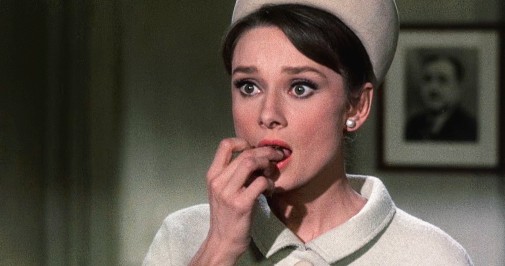
The Almost There series continues its traverse through the Criterion Channel's May offerings. After Cher in Robert Altman's Come Back to the 5 & Dime, Jimmy Dean, Jimmy Dean, and Ida Lupino in Vincent Sherman's The Hard Way, it's time to look at Charade, directed by the incredible Stanley Donen. The rom-com spy thriller was a critical and commercial success upon its original release, and its reputation continued to grow with time. Featured in multiple AFI Top 100 lists, Charade is beloved by many a classic movie aficionado, as well as Cary Grant and Audrey Hepburn fans.
The stars are in top form, delivering blinding charisma and irresistible charm. So much so that one has to wonder how close they came to Oscar nominations. Especially Hepburn, who was at the peak of her popularity…
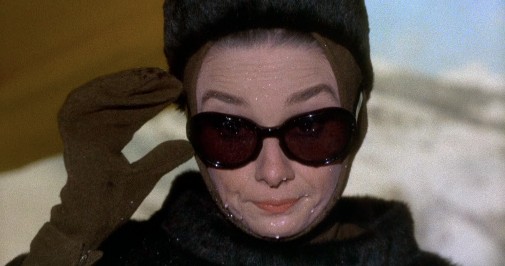
For all its frothy glamour and airs of a sophisticated sex farce, Charade starts with violent death, a blood-smeared visage, lifeless eyes staring into nowhere. Such carnage will reoccur throughout, making for a somewhat bizarre tonal cocktail. Many have compared it to Hitchcock's cinema, and it's easy enough to find the similarities. And yet, the whole affair is obsessed with the clash of elegance and savagery, a sweet colorful cocktail with a shot of strychnine added in for kicks, but not enough to kill. Donen always seems more interested in comedy and romance, using the murderous plot as a means to an end rather than an end in itself.
Andrew Sarris famously described the movie as one that "displays the sick qualities of a fashion show in a funeral parlor," and he's not wrong. Amoral and aloof, the movie introduces Audrey Hepburn as a discontented interpreter pondering divorce in a scene of great irony. Bedecked in custom Givenchy as she holidays in the French Alps, American ex-pat Reggie Lampert is unaware that the man she wishes to cut ties with is already gone. He's the man we saw die before the credits rolled, and, of course, talk of the divorce is superfluous for a widow.
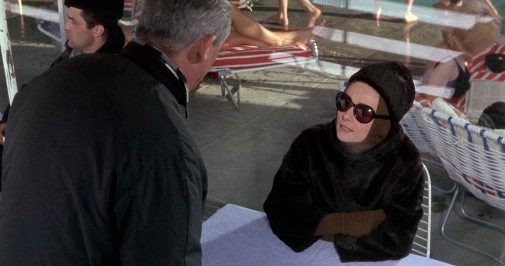
She'll find this out soon enough once she returns to Paris, but, for now, Hepburn spends her time being annoyed at young tots with water guns and a handsome Cary Grant. He's Peter Joshua, a mysterious compatriot that immediately catches Reggie's curiosity. She flirts with dry disinterest, a cold variation of Hepburn's many on-screen infatuations with older men. Indeed, Charade upends that narrative model so common in its leading lady's filmography. It does this by presenting Reggie as an independent grown woman with her own agency and acknowledging the stars' generational differences.
As played by Hepburn, Reggie's no impressionable girl but a widow with a taste for older gents (at least this particular one) and no qualms about pursuing her desires. More on that later.
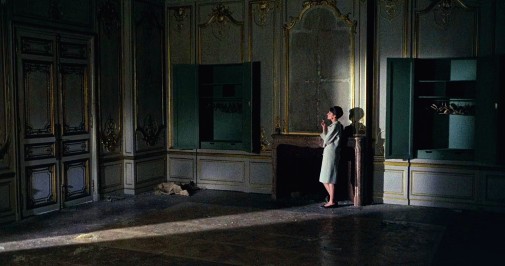
What's perhaps most important is how she's an extension and embodiment of Stanley Donen's peculiar approach to the material. Back in the City of Lights, she comes home to an emptied apartment and news of her husband's death. All of this is played with studied detachment until Reggie's confronted with the dead man's secret identity as a spy. Even then, rather than going for drama, Hepburn and Donen both opt for something that might elicit a soft chuckle but no heartbreak whatsoever. Just look at her husband's funeral, a scene of cartoonish parody despite its rigorous form.
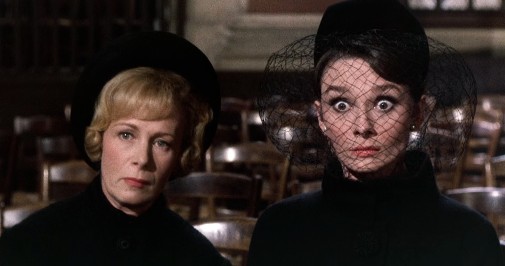
In a near-empty church, Reggie and a friend regard the open casket with no hint of mournfulness. Grief has no place in Charade, where a procession of odd characters come to pay their respects by sticking pins into the corpse and double-checking if he's not drawing breath. Instead of reacting with outrage, Hepburn plays the moment as an opportunity to ham it up in funny reaction shots. Her face a mask of bemused amusement, she's not exactly the picture of a tearful widow. To hammer the point home, she's quick to abandon mourning attire for a cherry bomb red coat and a leopard hat.
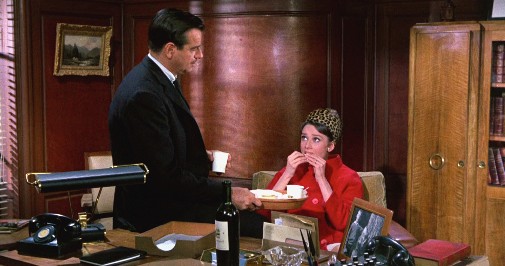
If anything, Hepburn plays Reggie's growing involvement in the spy plot as a movement motivated by selfish fear for her safety. Please don't read some moralist judgment into these words. It's refreshing to see this kind of Old Hollywood diversion trust us to care about a heroine without putting much effort into making her outwardly sympathetic. She's glamorous and fun to be around – that's enough for Donen, Hepburn, Peter Joshua, and me, too. That's not to say the actress repudiates her character's humanity.
Reggie can be tender and nervous, vulnerable when faced with fatal threats and scary men. Watching her lose her mind when in the company of a psychopathic James Coburn almost makes me wish Hepburn had done some horror. Such scenes certainly feel like a precedent for what she'd do in Wait Until Dark, four years after Charade. But of course, there's a limit to how much viscerality this cinematic dessert can sustain. Whether by purpose or accident, Hepburn never pushes too far. Even when doubting Joshua's intentions, there's a tongue-in-cheek quality to her performed suspicion.
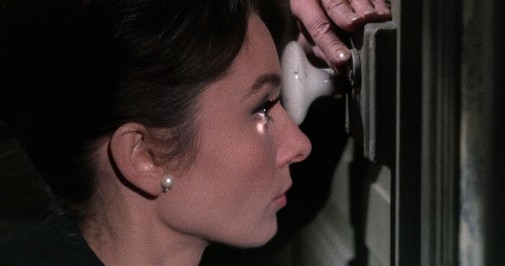
It's all in the doll-like eyes, the fashion editorial poses, the unbending lean into comedy that makes Reggie out to be a charmingly incompetent spy. There's also the constant snacking, of course. Reggie's oral fixations are one of the characterizations' weirdest and most memorable aspects - she's almost always drinking, eating, or smoking, especially when being told stress-inducing information. The gamine's appetite extends further into the realm of erotic irreverence. Her eyes are hungry for Cary Grant's mystery man, her mouth watering at the possibility of flirting with transgression.
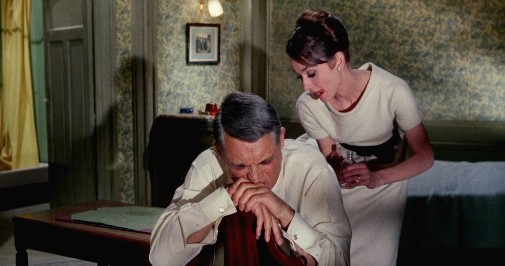
One of the best scenes in the movie finds Reggie taking care of her beau's wounds, ripping open his shirt before dabbing a cotton ball on the torn flesh. Speaking of the incoming sting, Hepburn is bursting with excitement and ends the theatrics by sitting on Grant's lap. It's delightful and surprising to see a woman's sexuality at the center of a genre famous for its macho lotharios. Adding to that, while never undermining Reggie's autonomy, Hepburn still plays it all like a fun lark. Sure, it's a life-or-death scenario but there's always time for a laugh.
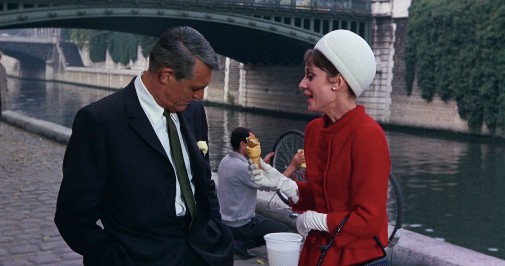
Audrey Hepburn could be a gawkishly mannered actress to a detrimental degree, but some filmmakers were able to either tone down or weaponize that aspect of her work. Stanley Donen was one of them, and Charade exemplifies mannerism as a feature rather than a bug. Still, when asked to showcase grounded nuance, she's able to switch modes. For example, Reggie's talk with a kind old philatelist recalls the subdued naturalism of The Nun – Hepburn's greatest performance. Charade might not likewise be the actress' best hour, but it's up there in the top echelon of her work.
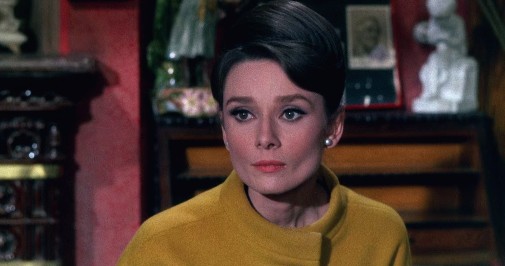
Regardless of the performance's excellence, Audrey Hepburn must have been part of the awards conversation due to her fame alone. Charade opened before the My Fair Lady casting kerfuffle hit its peak, and it sure feels like a logical follow-up nomination to the actress' work in Breakfast at Tiffany's. She was nominated for the Golden Globes and went on to win the BAFTA in 1965 while also scoring a Golden Laurel nod. Yet, when it came time to choose its Best Actress quintet, AMPAS looked the other way. Moreover, the Academy delivered one of its strangest lineups.
The nominees were Leslie Caron in The L-Shaped Room, Shirley MacLaine in Irma La Douce, Patricia Neal in Hud, Rachel Roberts in This Sporting Life, and Natalie Wood in Love with the Proper Stranger. First up, two could be seen as inverse category fraud, with Neal winning the trophy for a supporting role calling itself a lead. Second, they collectively represent a collection of social taboos. Infamous gossiper and all-around conservative menace Hedda Hopper was notoriously incensed at this.
She referred expressly to Wood and Caron, both playing young unwed women dealing with unexpected pregnancies. But then, there is MacLaine playing a Parisian prostitute, Roberts starring in a tale of a rocky marriage that explodes in domestic violence, and Neal, whose big scenes revolve around the threat of rape. These are pictures made at a time of social upheaval that mostly try, in their way, to acknowledge the reality of the times - something the Oscars have always been reluctant to accept.
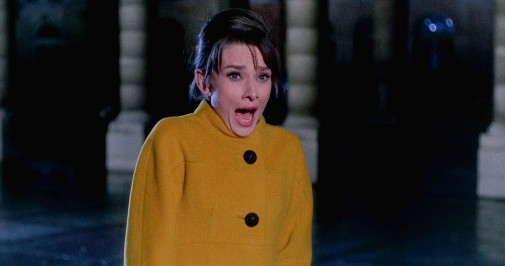
Returning to the question of Charade's star, maybe AMPAS just had their fill of Audrey Hepburn-types already. Leslie Caron was the prototypical song and dance European gamine of midcentury Hollywood, with a lot of her career living presently in the shadow of Hepburn's legacy. On the other hand, MacLaine was starring in another of Billy Wilder's Parisian movies, which had once featured Hepburn in the lead. On top of that, it's easy to see a thread connecting her Irma to the silver screen version of Holly Golightly.
Honestly, while Charade deserved a Best Actress nomination over some of these films, the lineup feels like a precious time capsule of great historical interest. I'm not sure I'd trade it for another nod to someone who, at the time, was already a winner. In the end, Hepburn would go through another snub before securing her fifth and final Oscar nomination for 1967's Wait Until Dark. Are you content with this state of affairs, or would you rather have seen Audrey Hepburn get more nominations, either for Charade or other pictures?
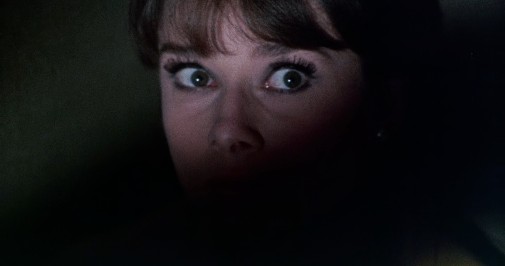
Beyond the Criterion Channel, Charade is also streaming on Amazon Prime. You can also rent it on several services.